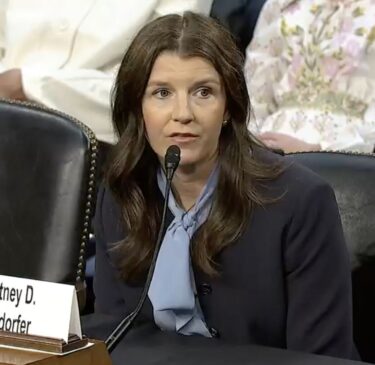NCJW opposes Whitney D. Hermandorfer. Here’s why:
With less than the experience typically required for a qualified rating from the nonpartisan American Bar Association, Whitney Hermandorfer’s record reflects a troubling pattern of extreme legal advocacy and ideological bias. From defending Tennessee’s abortion ban and opposing key protections under the Pregnant Workers Fairness Act, to challenging civil rights for transgender individuals and supporting attacks on birthright citizenship, Ms. Hermandorfer has repeatedly aligned herself with efforts to roll back fundamental rights. Her work raises serious concerns about her ability to serve as a fair and independent judge.
Whitney Hermandorfer’s stance on important issues:
Abortion:
Ms. Hermandorfer unsuccessfully attempted to defend Tennessee’s near-total abortion ban that denied pregnant people medically necessary and potentially life-saving abortion care. She also led a 17-state challenge to invalidate an Equal Employment Opportunity Commission rule that would have included abortion care under the Pregnant Workers Fairness Act, a critical protection against workplace discrimination. And, Ms. Hermandorfer unsuccessfully challenged the US Department of Health and Human Services when Tennessee’s Title X funding was cut because the state did not comply with federal requirements that state-run Title X clinics offer abortion counseling and referrals when requested.
Civil Rights:
Ms. Hermandorfer played an active role in Tennessee’s discriminatory policies against transgender individuals. Most notably, she served as second chair in the Supreme Court case US v. Skrmetti, defending Tennessee’s ban on gender-affirming medical care for transgender youth. She also led the state’s challenge to a Biden administration Title IX guidance affirming that discrimination against transgender people was sex discrimination. Ms. Hermandorfer authored amicus briefs defending the Trump administration’s position in the birthright citizenship case, challenging well-established interpretations of the Fourteenth Amendment’s Citizenship Clause.
Executive Supremacy:
In Storch v. Hegseth, a Supreme Court case that was filed in response to Trump firing more than a dozen inspectors general at multiple independent government agencies, Ms. Hermandorfer filed an amicus brief on behalf of Tennessee supporting Trump’s actions.
Immigration:
Ms. Hermendorfer appeared as a counsel of record in defense of Trump’s policies to end birthright citizenship.
Workers Rights:
Ms. Hermendorfer served as counsel of record for Tennessee in Starbucks Corp v. McKinney, a case in which the Supreme Court sided with big business and limited the power of lower court judges to protect workers who were fired for attempting to unionize.
Education and Career Highlights:
Whitney Hermandorfer is currently the Director of the Strategic Litigation Unit in the Office of the Tennessee Attorney General. She was previously an associate at Williams & Connolly, LLP in Washington, DC. After graduating law school, Ms. Hermandorfer was a law clerk to Justices Samuel A. Alito and Amy Coney Barrett of the United States Supreme Court, Judge Brett M. Kavanaugh of the US Court of Appeals for the DC Circuit, and Judge Richard J. Leon of the United States District Court for the District of Columbia. Ms. Hermandorfer earned her BA, magna cum laude, from Princeton University and her JD from the George Washington University Law School, where she graduated summa cum laude, first in her class, and served as Editor-in-Chief of the George Washington University Law Review.
